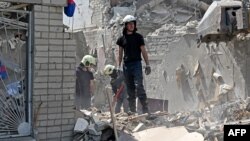Russia targeted more Ukrainian civilian sites with missiles on Tuesday, Ukrainian officials reported, a day after a deadly strike on a shopping center in the city of Kremenchuk that killed at least 18 people.
The new Russian attacks killed at least eight civilians, the officials said, in strikes on the southern Ukrainian port city of Mykolaiv and the northeastern reaches near Kharkiv, the country’s second largest city. Among those killed was a 6-year-old girl, while dozens were injured, including a 3-month-old baby left in a coma.
A Mykolaiv regional military administrator said Russia launched at least 11 missiles on targets in the region, with some of the missiles shot down by Ukrainian air defense systems and others getting through. Russia fired on the city using the same Soviet-era Kh-22 anti-ship missiles that were used in the strike on the shopping mall in Kremenchuk, a military spokeswoman said.
Russian forces also shelled civilian areas in the Kharkiv region, Ukrainian officials said, with at least five people killed there in the last 24 hours and another 22 wounded, including three children.
New sanctions
The new attacks came as the United States once again ramped up sanctions against Russian defense entities and individuals carrying out Russian President Vladimir Putin’s invasion of Ukraine, now in its fifth month.
The U.S. State Department and the Treasury Department imposed sanctions on Russia’s largest defense conglomerate, the state corporation Rostec, and dozens of Russia’s defense industry-based entities. The U.S. agencies also sanctioned an individual in Ukraine they said was illegitimately installed as a mayor by Russia, as well as 19 Rostec board members and nine of their adult family members.
Meanwhile, Ukrainian President Volodymyr Zelenskyy said Tuesday he stressed the need for a “powerful missile defense system for Ukraine to prevent Russian terrorist attacks” in talks with NATO Secretary-General Jens Stoltenberg ahead of the start of a summit of NATO leaders in Madrid.
The war in Ukraine is expected to be among the major topics of discussion at the NATO meeting. Stoltenberg declared, “At our NATO summit we will step up support for our close partner Ukraine, now and for the longer term.”
“NATO allies stand with you,” Stoltenberg said after talking with Zelenskyy.
Stoltenberg said Monday that the Western military alliance is declaring a sevenfold increase in the number of its troops on standby alert — from 40,000 to more than 300,000.
Rescue crews at the Kremenchuk shopping center worked Tuesday to search for survivors of the Monday attack.
Zelenskyy said there were more than 1,000 civilians inside the mall at the time of the attack, which he called “calculated.”
“This is not an accidental hit, this is a calculated Russian strike exactly onto this shopping center,” Zelenskyy said Monday in his nightly video address. He added that the strike “is one of the most daring terrorist attacks in European history.”
Zelenskyy had said earlier on Telegram that the shopping center, in the city 300 kilometers southeast of the capital, Kyiv, was “no danger to the Russian army, no strategic value.”
U.S. Secretary of State Antony Blinken tweeted, “The world is horrified by Russia’s missile strike [Monday], which hit a crowded Ukrainian shopping mall — the latest in a string of atrocities. We will continue to support our Ukrainian partners and hold Russia, including those responsible for atrocities, to account.”
U.N. spokesperson Stephane Dujarric called the attack “deplorable” and said the U.N. Security Council would meet Tuesday at Ukraine’s request following the strike.
Group of Seven
Leaders of the Group of Seven leading industrialized economies closed a meeting Tuesday in Germany by expressing support for Ukraine and a pledge to “continue to impose severe and immediate economic costs on President Putin’s regime for its unjustifiable war of aggression against Ukraine.”
The statement said the G-7 countries would boost their efforts to address the wider impact of the war, including on global energy and food supplies.
The leaders also said they will consider ways to bar services “which enable transportation of Russian seaborne crude oil and petroleum products globally, unless the oil is purchased at or below a price to be agreed in consultation with international partners.”
They said such a plan would allow the most vulnerable countries to maintain access to Russian energy markets.
In addition to efforts to reduce dependence on Russian energy supplies, rounds of sanctions already enacted have targeted Russian energy exports to both pressure Putin to end the war and to try to hamper Russia’s ability to fund its war effort.
Some information for this report came from The Associated Press and Reuters.




